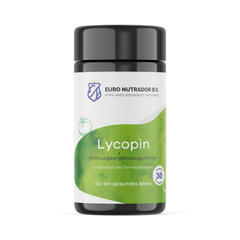Anyone strolling through a lively market, especially in the tropics, swims through a sea of colors. A sea of colors we owe to lycopene, where the color red dominates in all its variations, from delicate pink to rich purplish blue.
The velvety red of watermelon as well as the intense blood red of sun-ripened bell peppers or the lush red of ripe tomatoes comes from lycopene. But not only that: this substance is also found in pumpkins, mangoes, peaches, apricots, various berries, rose hips, and grapefruits.
But this powerful antioxidant, known for its health benefits, also holds secrets that not everyone is aware of.
What consumers need to watch out for: Common questions about the side effects of lycopene
Can excessively high doses be harmful to health?
Lycopene, like any effective medication, has side effects. As with everything, excess can have negative effects here too. Permanent doses of up to 0.5 mg per kilogram of body weight seem absolutely risk-free. Some pharmacologists consider 75 mg per day to be reasonable. Even doses over 200 mg are recommended by some.
What side effects of lycopene are known?
Lycopene and stomach complaints
In some cases, consuming large amounts of lycopene-containing foods can lead to digestive disorders. It is therefore worth listening carefully to your body. For example, how do I react to taking several tablespoons of highly concentrated tomato paste to reach my daily dose of lycopene, which can also have cancer-preventive effects?
- Does my stomach speak up?
- Do I suddenly tend to diarrhea?
And how do I react to a single tablet that contains the same amount of active ingredient?
Lycopene and pregnancy
Pregnant women as well as people taking various medications should consult their doctor before taking dietary supplements.
Lycopene and other medications
Lycopene can affect the action of some medications, especially the effect of blood thinners may be different.
Important: Although lycopene can also effectively contribute to blood thinning and even positively influence blood pressure with long-term use, blood thinners or blood pressure medications should never be reduced or discontinued without consulting a doctor!
Lycopene and allergic reactions
Allergic reactions to lycopene are extremely rare but possible in principle. Because it positively counteracts skin aging and wrinkle formation, consumers sometimes tend to overdose the active ingredient permanently.
This can lead to lycopenodermia, a harmless but clearly visible skin discoloration that disappears immediately after stopping the supplement.
Conclusion: Respect and the right dose
It is important to find a balance. As with everything in life, the right dose matters when taking lycopene.
Our walk through the market with its bright colors may have reminded us that food is more than just nourishment. It is a source of health and well-being as long as we choose consciously. Lycopene is clearly a friend in this sense, but one that should be treated with respect and knowledge of its limits. As with all aspects of nutrition, balance and the right dosage are crucial.
A balanced diet that, in addition to the moderate intake of our Lycopene capsules from Euro Nutrador, also includes lycopene-containing foods can maximize the benefits without increasing the risks.
Legal notice regarding health-related claims:
Our information is for general informational purposes only and does not replace medical advice. Dietary supplements do not replace a balanced diet and a healthy lifestyle. Health-related claims about dietary supplements must comply with the Health Claims Regulation (EC) No. 1924/2006 and be approved by the European Food Safety Authority (EFSA). If you have health complaints or questions, please consult a doctor.
Legal notice regarding health-related claims:
Our information is for general informational purposes only and does not replace medical advice. Dietary supplements do not replace a balanced diet and a healthy lifestyle. Health-related claims about dietary supplements must comply with the Health Claims Regulation (EC) No. 1924/2006 and be approved by the European Food Safety Authority (EFSA). If you have health complaints or questions, please consult a doctor.













